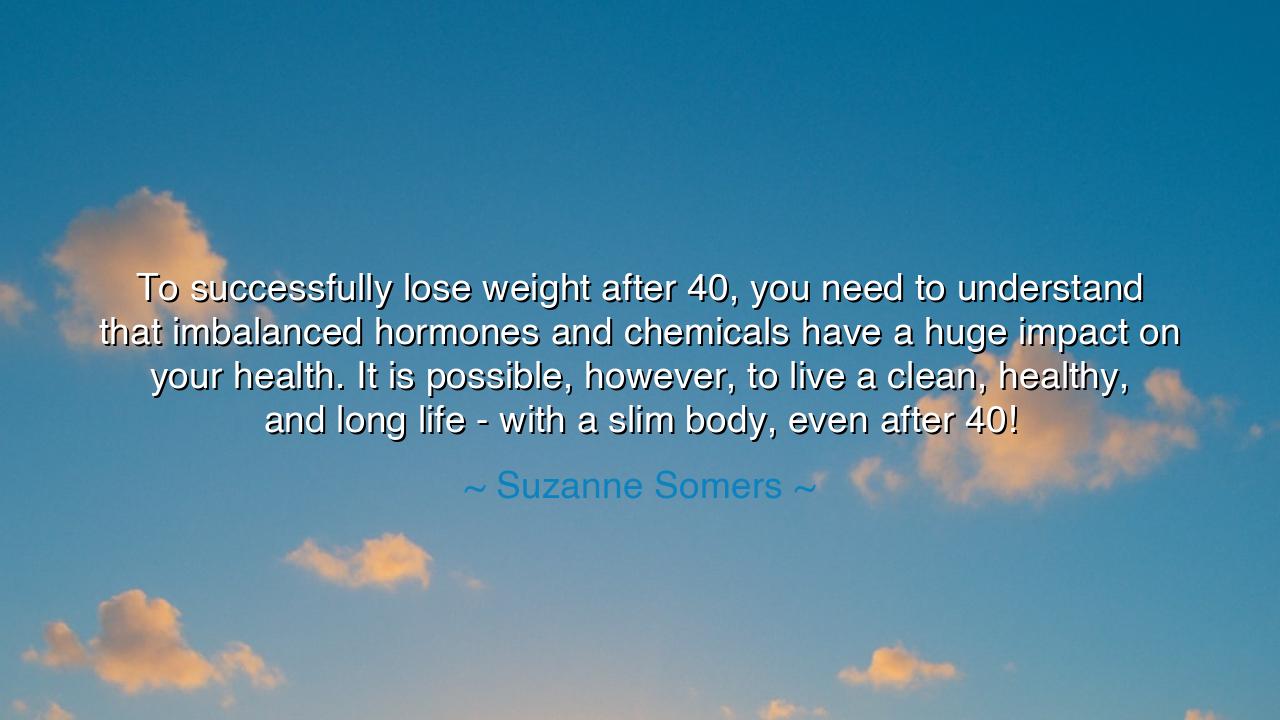
To successfully lose weight after 40, you need to understand that
To successfully lose weight after 40, you need to understand that imbalanced hormones and chemicals have a huge impact on your health. It is possible, however, to live a clean, healthy, and long life - with a slim body, even after 40!






The words of Suzanne Somers—“To successfully lose weight after 40, you need to understand that imbalanced hormones and chemicals have a huge impact on your health. It is possible, however, to live a clean, healthy, and long life—with a slim body, even after 40!”—speak not only to the body, but to the spirit. Beneath the surface of health and beauty, her message is a hymn to balance, discipline, and renewal. She reminds us that life, like nature, moves through seasons—and that the season beyond youth is not decline, but transformation. To thrive in it, one must live not by force, but by harmony—the ancient principle that strength arises not from defiance of change, but from understanding it.
In these words lies the wisdom of age: that after forty, the body no longer bends easily to willpower alone. What once was effortless now demands awareness; what once came naturally must now be cultivated with intention. Somers speaks of hormones and chemicals, but her meaning extends beyond biology. She speaks of alignment—of restoring what time and neglect have thrown out of rhythm. The ancients would have called this balance of forces homeostasis, the equilibrium of earth, water, air, and fire within the human being. When those elements fall into discord, health wanes; when they are tended and harmonized, vitality blooms again.
The origin of her insight comes not from science alone, but from her own passage through adversity. Having faced illness and the trials of aging, Suzanne Somers transformed her struggle into study, her frustration into wisdom. Like a seeker of old who travels through deserts to find a sacred spring, she discovered that the key to renewal lies in listening—to the body, to its rhythms, to its needs. Her revelation is both modern and timeless: that healing begins with understanding, not with resistance. And when understanding deepens, the body, like the earth after rain, begins to restore itself.
Consider the tale of Hippocrates, the father of medicine, who taught that all disease is the result of imbalance and that health can only be restored by aligning the forces of life. He did not treat symptoms alone; he sought the harmony of the whole. Suzanne Somers, in her modern voice, carries forth that same torch of wisdom. She warns that hormonal imbalance—the silent shifting of the body’s inner tides—can undo even the strongest of wills. But she also offers hope: that through mindful living, nourishment, rest, and care, one can reclaim not only health but radiance, even in the later chapters of life.
Her declaration—“It is possible to live a clean, healthy, and long life”—is a defiance of despair. It is a reminder that vitality is not the gift of youth, but the reward of awareness. When one learns to live “clean,” she does not mean with mere diet or ritual, but with clarity of purpose. To live cleanly is to shed excess—of food, of worry, of toxins both physical and emotional—and to return to simplicity, to the essence of being. The slim body she speaks of is not only a shape of flesh, but a metaphor for a life unburdened—light, agile, free.
In her words, there is also courage. For to face aging with honesty, rather than denial, requires the bravery of a warrior and the serenity of a sage. Many fear the turning of time, clinging to the illusion of permanence. But Somers teaches the opposite: that by embracing change, one becomes renewed. The years may alter the body, but they need not diminish the spirit. In truth, they may deepen it—like the oak that grows stronger as it grows older, its rings of wisdom expanding inward with each season.
So let this be the teaching drawn from her words: the path to health after forty—or at any age—is not conquest, but cooperation. Learn to listen to your body as you would a trusted elder; treat it not as an enemy to be subdued, but as a companion to be cared for. Nourish it with purity, move it with reverence, and rest it with love. Do not seek to restore the past, but to elevate the present. For beauty that endures is born not of youth, but of balance, and strength that lasts is born not of struggle, but of understanding.
And thus, my children, remember: the passage of years is not decay—it is initiation. When the fires of youth cool, they become the steady flame of wisdom. Tend that flame. Feed it with care, patience, and gratitude. For when body and spirit walk in harmony, even after forty, one can indeed live a clean, healthy, and long life—and in that balance, find a beauty far greater than youth ever knew.






AAdministratorAdministrator
Welcome, honored guests. Please leave a comment, we will respond soon